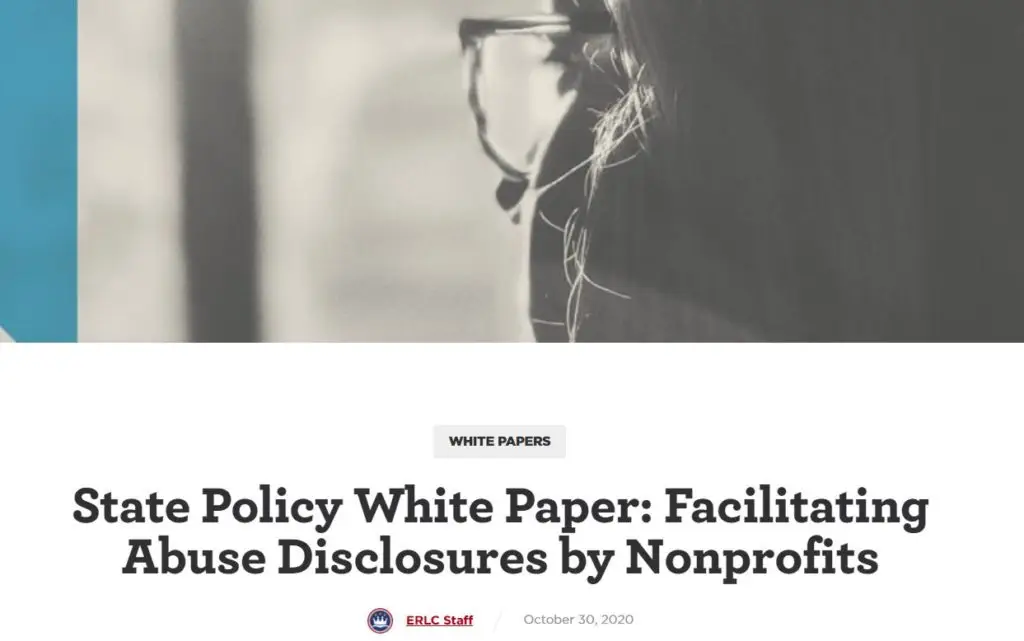NASHVILLE (BP) – The Southern Baptist Ethics & Religious Liberty Commission and a special advisory group have published the first of a series of state policy “white papers” to encourage the enactment of laws that prevent sexual abuse and enable survivors to gain access to justice.
The ERLC and the Sexual Abuse Advisory Group (SAAG) issued the document, “Facilitating Abuse Disclosures by Nonprofits,” Oct. 30. The paper provides guidance on enacting state laws to protect churches and other nonprofits from civil liability when they report sexual abuse allegations to a former employee’s current or potential employer.
The white paper offers a 2019 Texas law and a 2020 Missouri bill as samples of measures that address the need to protect churches and nonprofits from being sued when they seek to prevent sexual predators from abusing victims in other locations. Southern Baptists have been instrumental in support of the legislation in both states.
The new document is another part of the multi-faceted effort by a partnership of the ERLC and SAAG that began more than two years ago.
State laws to guard churches and nonprofits from lawsuits are needed because employees who are caught committing sex abuse or suspected of doing so often move to another congregation or charity, according to the ERLC/SAAG paper.
“[M]any perpetrators are able to move from one church to another with near impunity,” the document says. In a 2019 investigative series, The Houston Chronicle “found dozens of instances in which church leaders apparently failed to disclose concerns about former employees who applied for jobs at other congregations,” according to the white paper.
“This abuse pipeline from one church to another must be shut down,” the ERLC and SAAG say.
Sexual abusers exploit the reality that some churches and nonprofits are hesitant to share information about perpetrators because of fear they will be sued for defamation of character, according to the document.
“While it is imperative for churches to protect the vulnerable whether they are shielded from liability or not, a law such as [Texas’] can make it easier for church leaders to do the right thing,” the white paper says.
The Texas law grants immunity from civil liability to churches and other nonprofits that report in good faith allegations of sexual abuse, harassment or misconduct “reasonably believed to be true” of a former employee or volunteer to a current or potential employer.
The Southern Baptists of Texas Convention supported the bill, and state Rep. Scott Sanford, a Southern Baptist pastor, introduced it. Sanford is executive pastor of Cottonwood Creek Church in Allen, Texas.
In a March hearing in the Missouri legislature, Jonathan Whitehead, a Kansas City-area lawyer, testified in support of a bill based largely on the Texas law.
Whitehead, a Southern Baptist who has provided legal counsel for the Missouri Baptist Convention and some of its entities, said the Missouri bill “would solve a problem faced by many churches and charities. Predators under suspicion in one organization can move to another group and target new, unsuspecting victims. Background and reference checks can help stop that kind of movement.
“But they only work if churches and charities can tell the truth to each other,” he said in written comments. “Many charities tell us they are afraid of being sued if they fully answer these important questions. Churches, especially, should have the religious freedom to tell the truth to each other about ministry concerns.”
Measures like the Missouri proposal “set clear, legal rules for churches and charities as they seek to answer background check questions,” said Whitehead, who serves as an ERLC trustee.
State Rep. Doug Richey, senior pastor of Pisgah Baptist Church in Excelsior Springs, Mo., introduced the bill, which did not receive a vote in the House of Representatives this year, and Missouri Baptists provided support for the legislation.
SBC President J.D. Greear established the SAAG in 2018 in response to reports of abuse among Southern Baptist churches and entities. In cooperation with the ERLC, the group of experts in a variety of fields received input from hundreds of people, including abuse survivors and their advocates, law enforcement officials, counselors, pastors, denominational leaders and lawyers.
This article was originally published by Baptist Press at baptistpress.com

